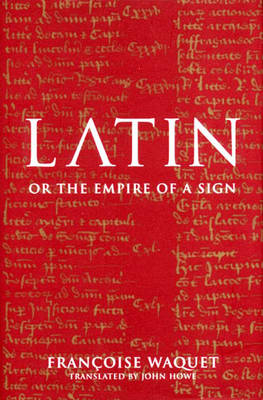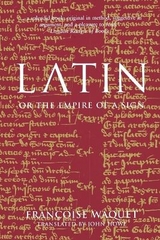
Latin
or, the Empire of a Sign
Seiten
2001
Verso Books (Verlag)
978-1-85984-615-5 (ISBN)
Verso Books (Verlag)
978-1-85984-615-5 (ISBN)
- Titel erscheint in neuer Auflage
- Artikel merken
Zu diesem Artikel existiert eine Nachauflage
A highly original and accessible history of Latin between the sixteenth and twentieth centuries
For almost three centuries, Latin dominated the civic and sacred worlds of Europe and, arguably, the entire western world. From the moment in the sixteenth century when it was adopted by the Humanists as the official language for schools and by the Catholic Church as the common liturgical language, it was the way in which millions of children were taught, people prayed to God, and scholars were educated. Francoise Waquet's history of Latin between the sixteenth and twentieth centuries is a highly original and accessible exploration of the institutional contexts in which the language was adopted. It goes on to consider what this conferring of power and influence on Latin meant in practice. Among the questions Waquet investigates are: What privileges were, and are still, accorded to those who claim to have studied Latin? Can Latin as a subject for study be anything more than purely linguistic or does it reveal a far more complex heritage? Has Latin's deeply embedded cultural legacy already given way to a nostalgic exoticism? Latin: A Symbol's Empire is a valuable work of reference, but also an important piece of cultural history: the story of a language that became a symbol with its own, highly significant empire.
For almost three centuries, Latin dominated the civic and sacred worlds of Europe and, arguably, the entire western world. From the moment in the sixteenth century when it was adopted by the Humanists as the official language for schools and by the Catholic Church as the common liturgical language, it was the way in which millions of children were taught, people prayed to God, and scholars were educated. Francoise Waquet's history of Latin between the sixteenth and twentieth centuries is a highly original and accessible exploration of the institutional contexts in which the language was adopted. It goes on to consider what this conferring of power and influence on Latin meant in practice. Among the questions Waquet investigates are: What privileges were, and are still, accorded to those who claim to have studied Latin? Can Latin as a subject for study be anything more than purely linguistic or does it reveal a far more complex heritage? Has Latin's deeply embedded cultural legacy already given way to a nostalgic exoticism? Latin: A Symbol's Empire is a valuable work of reference, but also an important piece of cultural history: the story of a language that became a symbol with its own, highly significant empire.
Françoise Waquet is director of research emeritus at the Centre National de la Recherche Scientifique in Paris. Latin, or the Empire of a Sign is the opening volume in a highly praised sequence of books on the social worlds of intellectuals, continued most recently with Une histoire émotionnelle du savoir (2019).
| Erscheint lt. Verlag | 17.7.2001 |
|---|---|
| Übersetzer | John Howe |
| Verlagsort | London |
| Sprache | englisch |
| Maße | 163 x 244 mm |
| Gewicht | 687 g |
| Themenwelt | Geisteswissenschaften ► Sprach- / Literaturwissenschaft ► Sprachwissenschaft |
| Sozialwissenschaften | |
| ISBN-10 | 1-85984-615-7 / 1859846157 |
| ISBN-13 | 978-1-85984-615-5 / 9781859846155 |
| Zustand | Neuware |
| Informationen gemäß Produktsicherheitsverordnung (GPSR) | |
| Haben Sie eine Frage zum Produkt? |
Mehr entdecken
aus dem Bereich
aus dem Bereich
Das umfassende Standardwerk auf der Grundlage der aktuellen amtlichen …
Buch | Hardcover (2024)
Duden (Cornelsen Verlag)
CHF 48,95



